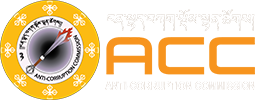The Anti-Corruption Commission (ACC) launched the National Integrity Assessment (NIA) 2019 report on 24th June 2020. The NIA 2019 is the fourth of its kind adapted since 2009 and has been developed on the past three NIA components. The NIA in general is an assessment of whether, in an agency, a public official follows standard procedures in providing services in a fair, transparent, and accountable manner.
The NIA is conducted on the public agencies and services that are selected for the assessment as a result of vulnerability to corruption and importance to socio-economic development. The NIA 2019 assessed selected services provided by agencies in the Financial Year (FY) 2018-2019 and covered 11 different categories of agencies comprising 272 services from 96 agencies. A total of 13869 respondents comprising 9861 service users (External Clients) and 4008 service providers (Internal Clients) were covered.
The NIA uses a scale from 0 to 10 where 0 is highly corrupt and 10 is very clean. The NIA 2019 national score is 7.97 depicting a Good Level of integrity. At the national level, the score indicates that efforts and initiatives undertaken by the public agencies to improve integrity are on track to achieve intended results. However, a deeper analysis of each component for NIA indicates room for improvement.
The External Integrity score of 8.08 indicates a Very Good Level of integrity as perceived and experienced by the service users. This is mainly due to improvement in the sharing of information and the use of the e-service platforms. However, weak accountability culture in the form of public officials ignoring official duties, abuse of functions, and ineffective grievances redressal mechanisms require improvement.
Although, the experience of corruption in service delivery is very minimal with the score at an Outstanding Level (9.98), yet there is a prevalence of the perception of corruption in the form of favouritism based on friendship and family relationships. Fifty-three percent of service users believe that family and friendship are beneficial in having services processed faster. Similarly, 41.69% of service providers believe that instruction from supervisors and friendship are the most influential factors in providing service faster.
Despite the outstanding score for experienced corruption, it is a point of concern as there are incidences of payments made in the form of cash or kind, entertainment, and other forms of gratification by the service users. For example;
- One in 147 offered entertainment such as food and drinks to get the services;
- One in 274 offered other forms of gratification while availing services; and
- One in 379 service users made payment in cash or kind to get the services.
The score for Internal Integrity 7.98 indicates a Good Level of integrity. This is mainly attributed to the high score for Work Integrity. However, Integrity Culture and Corruption Control Systems in terms of public officials ignoring official duties to pursue a private interest, protection of whistle-blowers, and disciplinary actions against wrongdoings are found as some of the shortcomings.
It is encouraging to note that the score for experienced corruption in all the three components of Work Integrity (Personnel Management, Budget Execution, and Fairness in Assignment of Work) is at an Outstanding Level. However, in terms of Fairness in the Assignment of Work, one in 8 employees has received unreasonable work instructions either from the heads of the agencies or immediate supervisors. With low scores in fairness and trust of the six components, Ethical Leadership with a score of 7.82 indicates a Satisfactory Level of integrity.
For comparison of the NIAs (2009, 2012, 2016 & 2019), a separate integrity score excluding the Ethical Leadership Index (this component was not assessed before) from the NIA 2019 was generated. The scores represent a fluctuating trend where the highest score was noted in 2012 (8.37), followed by 2019 (8.01), 2016 (7.95), and least in 2009 (7.44).
In all the NIAs, the perception of corruption and ACC’s performance were assessed. The majority of the respondents feel that corruption is Quite Serious in Bhutan and has increased over the last five years. In terms of ACC’s efforts in combating corruption, there is a decline in the percentage of respondents for Doing Very Well over the years.
More importantly, to enhance the utilization of the NIA 2019 results by the public agencies, ACC will carry out discussions on the findings and recommendations with the relevant agencies. The integrity score of NIA 2019 is planned to be used as a baseline indicator to assess the 12 NKRA ‘Corruption Reduced’ in the 12th Five Year Plan (FYP). Similarly, the score for the agencies will form the baseline indicator for assessing Agency Key Result Area (AKRA) and Local Government Key Result Area (LGKRA). Moreover, the rationale of the NIA 2019 is in accord with the three strategic objectives of National Integrity and Anti-corruption Strategies (NIACS) 2019-2023 towards realizing the primary goal of Bhutan’s 12 FYP 2018-2023.
To reduce corruption and improve service delivery, it is imperative to prevent opportunities for corruption in service delivery and foster integrity in the systems. Therefore, NIA 2019 recommends to:
- Develop and implement service delivery standards;
- Educate service users and employees on service delivery standards;
- Strengthen ethical leadership;
- Strengthen Community Information Centers (CIC);
- Enhance front desk or reception information services;
- Strengthen e-services;
- Enhance implementation of Organizational Integrity Plan (OIP);
- Strengthen mechanisms to address administrative complaints; and
- Manage feedback and grievances.
ACC urges all public agencies to use the findings to reflect and institutionalize appropriate systems.

